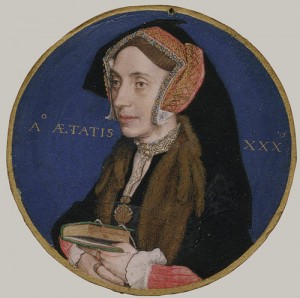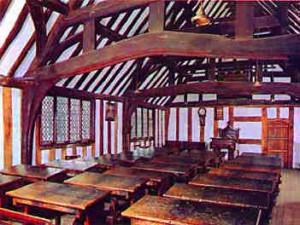 Tucked away on BBC4 on Thursday evening, under the title A Renaissance Education: the Schooling of Thomas More’s daughter, was what purported to be the story of one of the best-educated women in Tudor England, Margaret More. Even more tucked away within the programme was the story of the success of the Tudor grammar school system and of the importance of printing to promote learning and communication. Thomas Wolsey, who became the second most powerful man in the kingdom under Henry VIII was used as the prime example of a man whose rise can be traced back to his grammar school education. A further glowing example was, naturally, William Shakespeare. Several scenes were shot in Stratford-upon-Avon, including some in the old schoolroom at King Edward’s School, and the programme’s presenter, Helen Castor, interviewed Professor Jonathan Bate.
Tucked away on BBC4 on Thursday evening, under the title A Renaissance Education: the Schooling of Thomas More’s daughter, was what purported to be the story of one of the best-educated women in Tudor England, Margaret More. Even more tucked away within the programme was the story of the success of the Tudor grammar school system and of the importance of printing to promote learning and communication. Thomas Wolsey, who became the second most powerful man in the kingdom under Henry VIII was used as the prime example of a man whose rise can be traced back to his grammar school education. A further glowing example was, naturally, William Shakespeare. Several scenes were shot in Stratford-upon-Avon, including some in the old schoolroom at King Edward’s School, and the programme’s presenter, Helen Castor, interviewed Professor Jonathan Bate.
The programme was originally screened back in August when the radio programme Woman’s Hour ran a feature on it. It looked at the importance of language and reasoning and how the grammar school curriculum trained boys to be able to write persuasively. Margaret More and the neglected subject of women’s education undoubtedly deserved space on a TV programme, but the programme couldn’t conceal the fact that the real success of the Tudor educational system was that many bright young men from ordinary families were able to do well for themselves.
The programme also included a demonstration of the workings of printing using moveable type, one of my favourite subjects. A couple of years ago I was fortunate enough to have a go at printing a single page of his bible on a modern copy of Gutenberg’s original 1450 press, now kept at the University of Reading, which had been made for another TV documentary presented by Stephen Fry. Here’s a link to a short clip. Producing 180 copies of the bible in 1455 was Johannes Gutenberg’s major achievement, but although it’s known he spent many years developing his techniques he left no records of how he was eventually successful.
Last week we were treated to five special radio programmes by Melvyn Bragg entitled The Written World. This has celebrated handwriting from the earliest clay tablets to the Enlightenment. It would be hard to overemphasise the importance of writing since without it science, which relies on the regular documentation of observation and experiments, would be impossible. Although poetry and music don’t rely exclusively on being written down there would have been nothing of the sophistication of a Beethoven symphony or a Shakespeare play without it.
The invention of printing using moveable type was as important as the internet is now in terms of the spread of ideas and information. One of the most important drivers for printing was the desire to disseminate the Bible, and all the world’s major religions quickly took advantage of the technology of writing and printing. The Written World has interviewed specialists from many universities and libraries, and images of some of the treasures they have examined are pictured on the BBC’s website.



